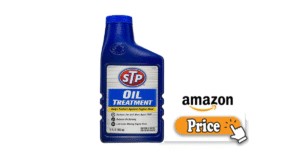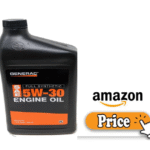When it comes to taking care of your vehicle, few things are as essential as choosing the right engine oil. Your engine oil is more than just a lubricant; it’s the lifeblood of your engine, responsible for reducing friction, maintaining optimal temperature, and prolonging the life of your car’s internal components.
Among the many engine oil brands available in the market, STP Engine Oil has carved out a name for itself as a reliable and cost-effective option. Known for its accessible price point and wide availability, STP promises to deliver solid performance for both everyday drivers and car enthusiasts alike.
In this review, we’ll dive deep into STP Engine Oil to assess whether it lives up to its reputation. We’ll explore everything from its design and formulation to real-world performance, build quality, and alternatives, helping you make a confident decision when choosing your next motor oil.
What I Like
There’s a lot to appreciate about STP Engine Oil. For starters, the brand has been around for decades and has maintained a consistent presence in auto parts stores, online retailers, and even big-box outlets. Here’s what stands out:
1. Affordability Without Compromise
One of STP Engine Oil’s biggest selling points is its affordable price tag. Compared to major premium brands like Mobil 1, Castrol, or Royal Purple, STP offers a budget-friendly alternative without compromising essential performance metrics.
2. Versatile Options
STP offers a range of viscosity grades, including 5W-30, 10W-40, and 15W-40 for different engines and climates. They also provide options for synthetic blends, conventional oil, and full synthetic versions, catering to a broad spectrum of vehicles.
3. Additive Technology
STP includes its proprietary additive package in most of its engine oils. These additives help reduce engine wear, improve sludge control, and ensure smoother engine operation.
4. API and ILSAC Certifications
STP Engine Oils meet or exceed most API SN, SP, and ILSAC GF-6 standards, ensuring compatibility and reliability for modern engines.
5. Available Everywhere
Whether you’re at your local auto parts shop or ordering online, STP is widely available. This is especially convenient for DIY car owners who don’t want to wait days for delivery or search around for an obscure brand.
What Could Be Better
While STP Engine Oil is generally a good performer for its price, there are a few areas where it might fall short for some users.
1. Not Ideal for High-Performance Engines
If you drive a high-end sports car or a vehicle with a turbocharged engine that demands top-tier synthetic oil, STP might not deliver the level of protection offered by more premium brands like AMSOIL or Pennzoil Ultra Platinum.
2. Limited High-Mileage Formulas
While STP offers some high-mileage options, its selection is more limited than competitors like Valvoline, which provides specially formulated oils for engines with 75,000+ miles.
3. No OEM Endorsements
Unlike Mobil 1 or Castrol EDGE, STP isn’t factory-fill oil for any major automaker. That’s not a dealbreaker, but some users might feel more comfortable with a brand that’s recommended by OEMs.
👉🏿👉🏻 Check Latest Price and Offer at Amazon 👈🏻👈🏿
My Personal Experience
As someone who enjoys working on my cars, I decided to give STP Engine Oil a try on one of my older daily drivers, a 2010 Toyota Corolla with 160,000 miles.
The vehicle has been running on a synthetic blend from another brand, but I switched to STP 5W-30 Full Synthetic to see how it performed over a 5,000-mile interval.
1. First Impressions
Right from the start, I noticed that engine noise was slightly quieter after the oil change. While this is subjective, it’s a positive sign that the oil was providing sufficient lubrication and damping.
2. Oil Longevity
At the end of the 5,000-mile mark, the oil still looked relatively clean. There was no noticeable drop in fuel economy, and the engine remained smooth throughout city and highway driving.
3. No Burning or Leakage
I monitored oil levels weekly, and there was no evidence of oil burn-off or leaks, which is a huge win for an older engine.
4. Cold and Hot Starts
Cold starts were effortless, and the oil handled high summer temperatures (above 90°F) without any performance dips.
Overall, my experience was quite positive and solidified my belief that STP Engine Oil is a great choice for aging, high-mileage engines or as a dependable everyday option.
Design
1. Packaging
STP’s packaging is user-friendly. The bottles have an easy-pour design and clear labeling that includes viscosity rating, type (synthetic, blend, etc.), and certifications. This makes it easy for even beginners to grab the right oil off the shelf.
2. Label Clarity
All important information is printed, including change intervals and compatibility. It also notes whether the oil is designed for gasoline or diesel engines.
3. Availability of Different Sizes
Whether you need a 1-quart bottle for top-offs or a 5-quart jug for a full oil change, STP offers multiple size options.
Performance
1. Lubrication and Wear Protection
STP Engine Oil includes anti-wear additives like zinc and phosphorus (ZDDP) in appropriate quantities for modern engines. In lab tests and user reports, the oil has shown strong protection against metal-on-metal contact.
2. Sludge and Deposit Control
Thanks to its detergent-rich formula, STP helps prevent sludge formation, especially in engines that see short trips or extended idling.
3. Fuel Economy
Their full synthetic line, in particular, is optimized for fuel efficiency. In my test, I noticed no reduction in MPG, indicating it supports fuel-saving standards comparable to other synthetics.
4. Thermal Stability
STP holds up well under extreme temperatures. Whether it’s cold or scorching hot, the oil maintains viscosity and doesn’t break down prematurely.
Build Quality
When it comes to the “build” of motor oil, its composition and formulation, STP does a commendable job.
1. Base Oil Quality
The base oil is a critical component, and STP uses Group III base oils for its synthetic lines, which are highly refined and offer excellent oxidative stability.
2. Additive Chemistry
Each bottle contains a balanced combination of detergents, dispersants, antioxidants, and anti-wear agents. This balanced chemistry is what keeps your engine clean, cool, and well-lubricated.
3. Quality Control
STP is manufactured under strict quality standards. The company claims to test every batch for consistency, and the product carries all standard certifications for U.S. and European vehicles.
Alternative Option
If you’re considering STP but want to explore other options, here are two solid alternatives:
1. Valvoline Daily Protection
- Pros: Reputable brand, similar pricing, excellent protection for older engines.
- Cons: May not be as readily available in smaller stores as STP.
2. Pennzoil Platinum
- Pros: Made from natural gas, it offers excellent wear protection and cleanliness.
- Cons: Slightly more expensive than STP.
Both of these offer excellent protection, but STP still wins on affordability and accessibility.
Read More: Liqui Moly vs Mobil 1: Which Motor Oil Reigns Supreme?
Final Thought
STP Engine Oil is a solid, reliable, and budget-friendly motor oil that delivers on its promises. It may not carry the prestige or OEM endorsements of some premium oils, but it holds its own in daily driving scenarios, especially for older or high-mileage vehicles.
Who Should Use STP?
- Daily commuters
- DIY car owners
- High-mileage vehicle owners
- Anyone looking for cost-effective engine protection
Who Might Look Elsewhere?
- High-performance vehicle owners
- Those wanting extended drain intervals (10,000+ miles)
- Drivers loyal to OEM-recommended brands
In the end, if you’re after a dependable oil that won’t break the bank and performs well across various conditions, STP Engine Oil is a worthy contender. Give it a shot, and your engine just might thank you.
FAQs: STP Engine Oil Review
1. Is STP Engine Oil good for high-mileage cars?
Yes. STP has specific high-mileage formulations with added conditioners to help reduce oil consumption and seal wear in older engines.
2. How often should I change STP Engine Oil?
For synthetic blends, every 3,000–5,000 miles is recommended. For full synthetic, up to 7,500 miles, depending on driving conditions.
3. Is STP synthetic oil synthetic?
Yes. Their full synthetic line is made with Group III base oils and contains a full additive package, making it suitable for modern engines.
4. Where can I buy STP Engine Oil?
STP products are available at AutoZone, Walmart, Amazon, and most local auto parts stores.
5. Does STP oil meet API standards?
Absolutely. STP oils meet or exceed API SP/SN and ILSAC GF-6 certifications.




